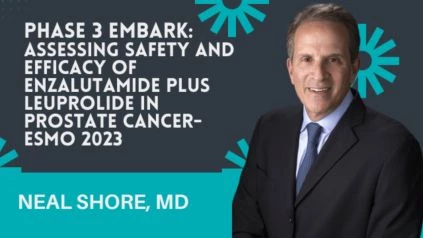By: Neal Shore, MD
Date: October 25, 2023
In the abstract describing the EMBARK Phase 3 trial, Dr. Neal Shore serves as a key figure in elucidating the trial’s primary objective. The primary aim of this clinical trial is to assess the safety and efficacy of the combination therapy involving enzalutamide and leuprolide in patients with high-risk biochemical recurrence of prostate cancer.
The patient group identified as “high-risk for biochemical recurrence” in this trial comprises individuals who have previously undergone primary treatment for prostate cancer and subsequently experienced a rise in prostate-specific antigen (PSA) levels. These patients are at greater risk for the cancer’s return and progression, which underscores the need for effective treatment options.
Regarding metastasis-free survival, the trial’s key findings indicated that the combination therapy of enzalutamide plus leuprolide demonstrated superior results compared to enzalutamide monotherapy and leuprolide alone. The data showed that patients receiving enzalutamide plus leuprolide experienced prolonged metastasis-free survival, underscoring the potential benefits of this combination therapy in preventing cancer progression.
Throughout the course of the trial, some notable safety concerns and adverse effects were associated with enzalutamide. These included side effects like fatigue, hot flashes, and cardiovascular issues. These effects could have some impact on patients’ quality of life, emphasizing the importance of carefully balancing the benefits and risks of treatment.
The results of the EMBARK Phase 3 trial carry significant implications for the clinical management of prostate cancer patients with high-risk biochemical recurrence. The data suggests that the combination therapy of enzalutamide plus leuprolide may be a promising approach for delaying the progression of prostate cancer in this specific patient group. This highlights the need for physicians to consider this combination therapy as a potential treatment option in their clinical practice, with careful monitoring of potential side effects to ensure the best possible outcomes for their patients. It also underscores the importance of individualized treatment decisions in the management of high-risk biochemical recurrence in prostate cancer.

